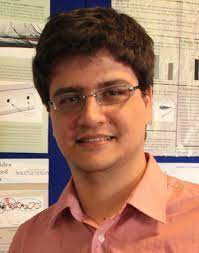Plenary Sessions

Prof. Dr. Adriano Todorovic Fabro
Department of Mechanical Engineering, University of Brasilia, Brazil
Development of a stochastic model for intermittent two-phase flow in horizontal pipes
Intermittent flows are common flow patterns in gas-liquid horizontal flow and attract attention and great research effort due to its importance for industrial and engineering applications. The slug flow is typically modeled based on a unit cell varying from an elongated air bubble with a liquid film in segregated flow pattern and an aerated liquid plug, the slug region, with remarkable stochastic characteristics of its alternating regions. In this paper, a two-state Markov chain model is proposed to represent the stochastic dynamics of developed slug flow in horizontal pipes. Each state represents either the liquid slug or the elongated bubble regions and the transition probabilities dictate the change of the given discrete time measurement to stay at a given state or change. This simple but insightful description of the phenomenon allows an analytical treatment of the statistics of Markov chain stochastic process. Measurement stations with two double wire resistive sensors are used to obtain the void fraction time series and a corresponding two-state representation. It is shown that the Markov chain model can successfully represent second-order statistics of the measurement, such as the autocorrelation and power spectral density, given an appropriate choice of the chain order. Subsequently, statistics of some slug flow features are estimated using the proposed approach and their interpretation as random variables derived from the void fraction stochastic process is discussed.
Short Biography
Prof. Dr. Adriano Todorovic Fabro has a PhD in Sound and Vibration from ISVR, University of Southampton, a master’s degree in Mechanical Engineering and a degree in Control and Automation Engineering from the State University of Campinas. He is currently an Adjunct Professor in the Department of Mechanical Engineering at the University of Brasilia since 2014. He is a CNPq productivity fellow level 2, executive member of the Technical Committee on Uncertainty Quantification and Stochastic Modeling and the ABCM Dynamics Technical Committee. He received the ABCM Hofer Young Researcher Award in 2019 for a young researcher in the field of Dynamics. He works on topics of structural dynamics, wave propagation, signal processing and uncertainty modeling and quantification.

Prof. Dr. Roberta de Queiroz Lima
Mechanics Engineering Department, PUC-Rio, Brazil
Measuring uncertainties in the response of a stick-slip oscillator
Sick-slip dynamics is a sort of universal dynamics. It appears in nature in a series of different guises. As a mass-spring oscillator is a prototype of a linear oscillator, the stick-slip is a prototype of a nonlinear oscillator. In the talk it will be presented in a mechanical fashion. One of the objectives is to describe a mean motion of a stick-slip oscillator and to show the different types of uncertainties that appears in this dynamics. Several statistics are computed to the system response over time. In the literature, these statistics are often used as measures of uncertainties. However, for the stick-slip oscillator analyzed in the presentation, each computed statistic shows a different tendency in relation to the quantification of the stochastic behavior of the system response. Thus, the different ‘measures’ of uncertainty used in the literature can be not compatible.
Short Biography
Prof. Dr. Roberta de Queiroz Lima received her double doctoral degree in Mechanical Engineering from the Université Paris-Est-Marne-la-Vallée and PUC-Rio, in 2015. Since 2015, she has been an Assistant Professor of the Department of Mechanical Engineering at PUC-Rio. Some of her interest areas are: dynamics of electromechanical systems, dry-friction, dynamics of flexible structures, nonlinear oscillators, stochastic modeling and uncertainty quantification.

